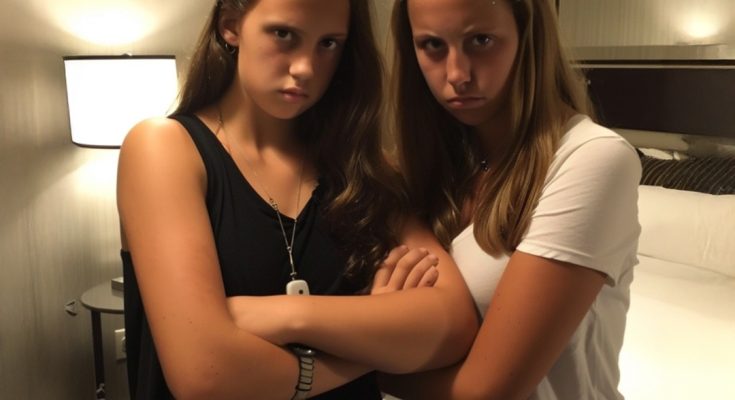Blending families is never easy, but after eight years of marriage to Candace, I thought we had found a way to make it work. My daughter Shiloh, sixteen, is quiet and introspective, often finding solace in books and sketching, while her stepsisters, Anna, nineteen, and Sophie, seventeen, thrive on energy and chaos. Though Shiloh tried to fit in, it was clear she often felt like an outsider.
ragedy struck when Shiloh’s mother, my ex-wife, passed away unexpectedly. The news shattered her, and my heart broke for my little girl. I left immediately to be with her, while Candace took Anna and Sophie ahead to the hotel where we’d stay for the funeral. She assured me she’d handle things, but something about her casual attitude left me uneasy.
Hours into my drive, Shiloh called, her voice trembling. “Dad… I’m sleeping on the floor,” she whispered, her words barely audible over her tears.
“What? Why?” I asked, gripping the steering wheel tightly.
Anna and Sophie said the bed’s too small for three people,” she replied. “Candace told me to let it go.”
Rage and heartbreak surged through me. “This isn’t okay, Shiloh,” I said firmly. “You shouldn’t have to deal with this, especially not now.” I reassured her that I’d fix it and hung up, my mind racing. Without hesitation, I called the hotel and arranged for a private room for Shiloh, ensuring she would be treated with the respect she deserved.
When I called Candace to explain, her response shocked me. “It’s just one night,” she said dismissively. “She’ll be fine.”
“No, Candace,” I shot back. “She just lost her mom. Sleeping on the floor while her stepsisters take the bed isn’t fine.”
“You’re blowing this out of proportion,” she argued. “Anna and Sophie are upset now, thinking you’re playing favorites.”
“This isn’t about favorites,” I said, my voice rising. “It’s about supporting a grieving child. Shiloh deserves compassion, not indifference.”
When I arrived at the hotel the next morning, the tension was palpable. Candace greeted me with frustration, accusing me of undermining her authority. “Do you realize how this looks?” she demanded. “You went behind my back!”
I did what needed to be done,” I replied. “You failed to stand up for Shiloh when she needed you most.”
The argument carried over into the funeral preparations. “This could ruin everything we’ve built,” Candace warned.
“If standing up for Shiloh jeopardizes this family, then maybe it wasn’t as strong as you think,” I said sharply.
At the funeral, Shiloh clung to my arm, her face pale with grief. As she whispered, “Thank you, Dad,” I knew I’d made the right decision. Later, back at home, I sat down with Candace to have a serious conversation.
“We need to ensure this never happens again,” I told her. “Shiloh has already lost her mother. She shouldn’t feel like she’s losing her place in this family too.”
Candace sighed, her voice quieter. “I didn’t handle it right. I’ll try to do better.”Shiloh’s hug that evening was all the confirmation I needed. “Thank you for standing up for me,” she said softly. Holding her close, I vowed to always protect her, no matter what challenges came our way. From that day on, I resolved to ensure Shiloh felt loved and valued, setting boundaries that prioritized her well-being and showed her she would never be alone.



